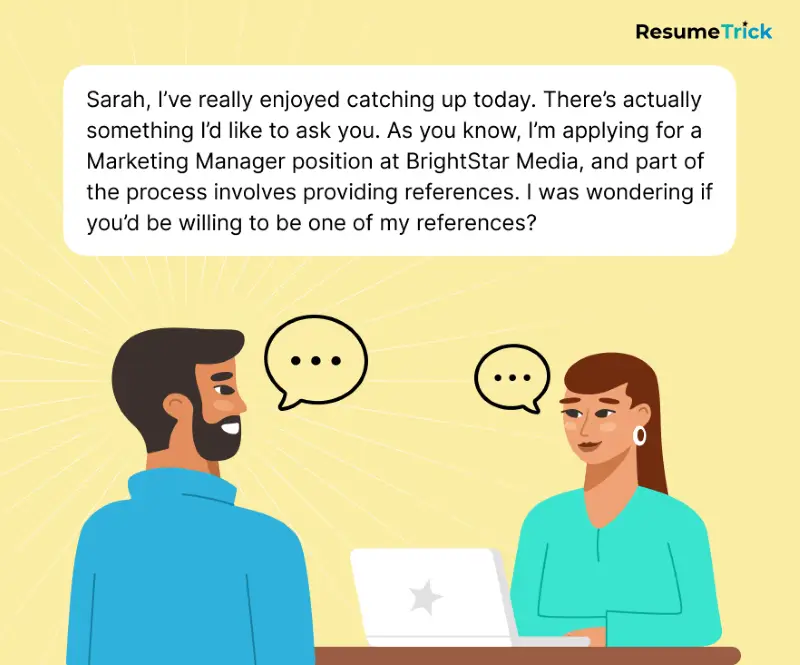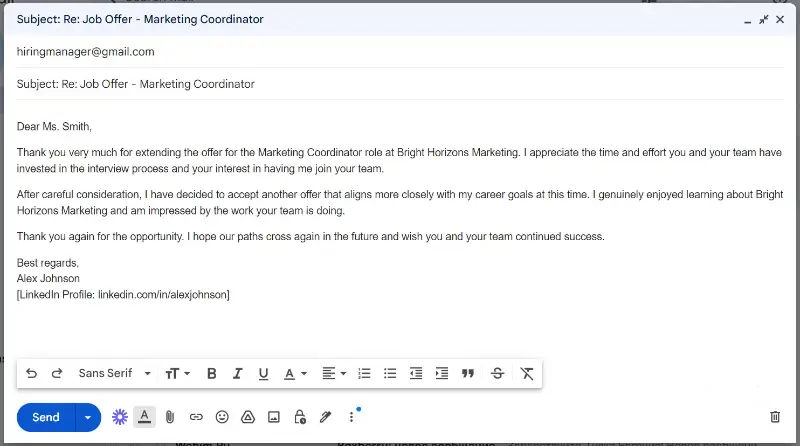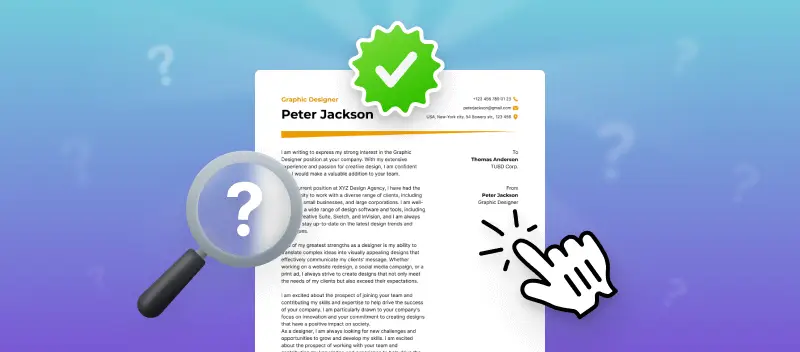Securing a person who can vouch for your professionalism might be a key factor in landing your next job or academic opportunity. However, asking someone to be a reference requires tact.
In this guide, we’ll teach you how to ask someone to be a reference. From selecting the right person to crafting your request, you'll learn how to approach this task with confidence. This will increase your chances of receiving a positive endorsement.
Choosing the person for a reference request
Professional references
These are provided by individuals who can speak to your work performance, skills, and accomplishments in a professional setting.
They typically include:
- Supervisors. Previous or current bosses who can discuss your job performance, work ethic, and contributions.
- Colleagues. Peers who have worked closely with you and can comment on your teamwork, communication skills, and technical abilities.
- Subordinates. If you’ve held a managerial role, people who reported to you can provide insights into your leadership and mentoring skills.
- Clients. Long-term or repeat clients can offer perspective on your professionalism, reliability, and ability to meet expectations under pressure.
Academic references
These are typically provided by educational professionals who can vouch for your academic abilities, achievements, latin honors, and character.
They include:
- Professors. Teachers who can discuss your performance in their classes and your potential.
- Academic advisors. Advisors who have guided you through your studies and can speak to your overall progress and goals.
- Research supervisors. Individuals who supervised your projects and can provide feedback on your research skills and scholarly contributions.
- Thesis committee members. Faculty who evaluated your major academic work and can assess your critical thinking and subject mastery.
Select references who are well-respected in their field or community. Their endorsement will carry more weight if they have a strong reputation.
Ideally, ask someone to be a reference if you have interacted recently. This ensures their feedback is current and relevant to your most relevant accomplishments
How to ask someone to be a reference?
Timing
When asking someone to be a reference, the timing can significantly influence the outcome. A well-timed plan not only increases your chances of a positive response but also demonstrates professionalism and respect for the reference.
Don’t approach someone during a high-stress season, such as during year-end financial closings or project deadlines. Instead, wait for a quieter period when they might have more time to provide a thoughtful reference.
Ask for a reference at least two to three weeks in advance. This timeframe allows the person to fit you into their schedule and prepare a detailed answer.
If you know the candidate you chose is dealing with personal issues, it’s considerate to delay your reference request until things settle down. Or find another person.
Methods
When it comes to how to ask for a reference, the method of communication can impact the effectiveness of your request. Selecting the right approach depends on various factors, including your relationship with the reference, their communication preferences, and more.
Reference request email provides a written record of the process. It allows the reference to respond at their convenience and review any attached materials, such as job descriptions or application guidelines.
Best used when:
- You are asking for a reference someone who is not in your immediate network or who prefers written communication.
- You need to provide detailed information related to the reference.
- You want to ensure that your request is clearly documented and can be referred back to if needed.
- You are reaching out across time zones or schedules that make live conversations difficult.
With a phone call, you can receive an instant response and clarify any questions or concerns on the spot. It provides a more personal touch, which can be effective if you have a close relationship with the reference.
Best used when:
- You have a close or longstanding relationship with the person you’re asking.
- You need to discuss details in real-time or negotiate any aspects of the reference.
- You’re in a situation where immediate feedback is valuable or required.
In-person dialog allows for a direct and personal conversation, which can be especially impactful if the person is someone you work with closely. It enables you to discuss the reference request face-to-face, which can help in clarifying expectations.
Best used when:
- You have regular interactions and feel comfortable asking them in person.
- The reference is someone you work with or see regularly, making a conversation appropriate.
- You want to make a more significant request, and an in-person meeting would enhance it.

Crafting your request for a reference
Never assume that someone is willing or able to serve as your reference. Reach out to your potential referee in advance, explaining your situation and asking if they would be comfortable providing a reference.
Once they’ve agreed, provide your referee with context. Share the details of the job you’re applying for, including:
- The role description
- The company’s background
- What they’re looking for in a candidate
- How they need to submit the reference
- Deadlines
- Your updated resume or CV for context
Highlight the key skills and experiences that you’d like them to focus on. Your referee is doing you a favor, so make the process as easy as possible.
If it’s a written reference, you might even offer to draft a template that they can modify.
Finally, be sure to thank your referee, both when they agree to provide the recommendation and after they’ve completed it. A genuine thank you shows appreciation and reinforces your professional relationship.
Examples of how to ask someone to be a reference
Sample email asking for reference
Subject: Request for Professional Reference
Dear Ms. Thompson,
I hope this message finds you well. I'm reaching out because I'm in the process of applying for a Marketing Manager position at Brightwave Media, and I wanted to ask if you would be willing to serve as a professional reference for me.
Having worked together at GreenLeaf Advertising for three years, I believe you can speak to my skills in campaign management, team leadership, and client relations. This is crucial for my new role.
If you're comfortable with this, I'd be happy to provide any additional information you may need.
Thank you for considering my request. I truly appreciate your support.
Best regards,
Sarah Davis
How to ask someone to be your academic reference:
Subject: Request for Academic Reference
Dear Professor Williams,
I hope you are doing well. I'm writing to ask if you would be willing to provide an academic reference for my application to the Master’s in Data Science program at Stanford University.
During my time in your Advanced Algorithms class, I gained valuable insights into computational theory and complex problem-solving, which I believe have prepared me well for this next step in my academic journey.
Given your familiarity with my work and dedication, I think your reference would greatly strengthen my application.
Please let me know if you need any additional information from me, such as my resume or a draft of my statement of purpose.
Thank you for your time and consideration.
Sincerely,
Emily Johnson
(555) 123-4567
How to ask for a reference in a creative industry:
Subject: Request for a Professional Reference
Dear Sarah Johnson,
I hope you're doing well! I’m reaching out to ask if you would be willing to provide a reference for me as I’m applying for a position at Pentagram. I’ve always greatly appreciated your guidance and the insights you’ve shared with me during our time working together on the "Urban Design Campaign" project for Nike, and I believe your perspective would provide valuable context to my application.
In particular, I think your feedback on my design skills and ability to creatively collaborate would be a strong addition to my application. It would mean a lot to me if you could speak to the work we’ve done together.
If you’re open to providing a reference, I’d be happy to share additional details about the job and the company. I can provide any information you might need to make the process as easy as possible. Of course, I understand if you're unable to assist, but I truly appreciate your consideration.
Thank you so much for your time and support!
Warm regards,
John Peterson
What to do after the email asking for reference?
If you haven't received a response after a week, send a polite follow-up email. Express understanding of their busy schedule and kindly remind them of your request.
Here's an example:
"I hope this message finds you well. I wanted to follow up on my previous email regarding a reference request. I completely understand if you’ve been busy, but I wanted to check in to see if you might be available. Please let me know if you need any additional information. Thank you so much for your time."
After you’ve accepted the job offer (or even if you don’t), let the referee know the outcome and to thank them again for their help. This not only closes the loop but also leaves the door open for future interactions.
FAQ
- What should a reference include?
- It should mention your relationship with the person, specific examples of your skills or achievements, and an endorsement of your qualifications for the role or program.
- Can I ask for a reference from someone who hasn’t supervised me?
- Yes, but make sure the person knows you well enough to speak to your qualifications and character.
- How many references do I need?
- Typically, 2-3 references are sufficient, but the exact number may vary depending on the job or program requirements.
- What should I do if the answer is delayed?
- Contact the person providing the reference to check on the status and inform the employer or institution if there’s a delay.
Conclusion
Asking someone for a reference can feel daunting, but with the right approach, you can make it a smooth and successful process.
By carefully choosing the right person, clearly communicating your request, and showing appreciation for their support, you set the stage for a strong recommendation that can enhance your career prospects.
Remember, a well-chosen reference not only supports your application but also reflects your professionalism and preparedness.
Create your professional Resume in 10 minutes for FREE
Build My Resume



